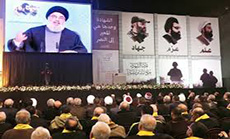
What did Sayyed Hassan Nasrallah Want to Say?

Ibrahim Bayram - Annahar newspaper
More than any time before, Hizbullah's Secretary General, Sayyed Hassan Nasrallah, seemed, in his last appearance, confident of the rightness of the choices he has been making for more than two years, when he took the hard decision which some have described as "an adventure with uncertain reverberations," and delved into the depth of the simmering field in Syria.
 At the time, only few believed that the Syrian regime, led by President Bashar al-Assad, would survive, especially after more than 140 countries gathered in coalition to back the Syrian opposition on one hand, and to renege on recognizing the legitimacy of the regime in Damascus on the other.
At the time, only few believed that the Syrian regime, led by President Bashar al-Assad, would survive, especially after more than 140 countries gathered in coalition to back the Syrian opposition on one hand, and to renege on recognizing the legitimacy of the regime in Damascus on the other.In counterpart, the majority believed that the vanishing of the regime would be a matter of days or months, and that it would soon depart with its choices and alliances.
Back then, Sayyed Nasrallah warned of the peril stalking Lebanon. Nonetheless, some considered the warning as an intended intimidation to justify the aforementioned "adventure."
In a nutshell, that day, the thought of Sayyed Nasrallah opting for hopeless futile choices, an even for a long exhaustion of its power and history, ramped.
Amid this confusion, Sayyed's supporters seemed to fear the unknown they might have been heading to, to the extent that a category of them doubted the promised victory this time, especially after the massive return of bodies of those who had fought and after grief and condolences prevailed in Dahiyeh, Bekaa, the South, and Jbeil.
In his latest appearance, Nasrallah spoke with utter confidence of three headlines:
The first: terrorism, which has just beheaded 21 Egyptians in Libya, has become a growing vice, killing innocents worldwide.
Therefore, Sayyed has presented a living example of the peril of this terrorism that is prevailing just like a malicious illness, flouting all boundaries, values, and the future of a religion that presents itself within a civilized frame.
Moreover, Sayyed Nasrallah sought to say that terrorism, which he chose to fight early in Syria, has become a world dilemma that even former Prime Minister Saad Hariri started to perceive. The man then dashed to call for launching a national strategy to fight it after he had berated Nasrallah's going to Syria, depicting his as "utterly insane." Even more, Nasrallah found, in light of all those dramatic developments, a golden chance to call those who had urged him to quit Syria for joining him willingly.
The second: the current juncture in the entire region is tilting towards further complications. Therefore, it would be illogical to call for self-dissociation. It is by this token that Nasrallah calls those seeking Lebanon's impartiality to relinquish their motto or insulate behind it.
The third: Nasrallah provides evidence on the rightness of his chronic specualtions, building on the inside, passing by his choice to face "Israel,' until opting for siding with the regime in Damascus.
By large, Nasrallah had the courage to speak publically of his strategic choices which surpass the frontiers of the small entity called Lebanon; in fact, terrorism that is striking in all directions and intimidating everybody in the most barbaric ways, has per se provided material and moral justifications to face it. Terrorism has indeed become an existing danger, inside the country and along borders, at only few miles from the capital Beirut.
On the internal level, Nasrallah seemed more reassured over three matters:
- His nine-year-old understanding with the Free Patriotic Movement has become an example to follow
- The future of the presidency of the republic in Lebanon is to be decided upon only through Nasrallah and General Michel Aoun's final word. The history of uncalculated presidents has gone.
- Nasrallah seemed more confident than his fiercest rival, Future Movement, which is now in a time that no longer allows it to escape dialogue with Hizbullah. He is certain that he is en route for reasonable endings "under the ceiling of the expectations," in an indirect response to those claiming that dialogue does not quell the principles of Future Movement's vision. According to the party's analyses, declaring cleaving to these principles is only for the sake of podiums, occasions, and a public that needs to get over confusion and interrogations.
In general, Nasrallah also seemed more confident that terrorism and impunity on one hand, and the steadfastness of the Syrian regime in the face of the war staged against it on the other, made of Hizbullah intervention in Syria a correct choice, albeit the high price and sacrifices.
Perhaps Nasrallah couldn't level such calls and visions with such certainty and confidence, before the supporters of his axis in Yemen managed to take power in Sanaa, hence imposing new equations and irrevocable facts in a country that is specially located.
Anyway, Sayyed Nasrallah and his party are acting considering that his rivals in Lebanon have become incapable of facing his calculus and choices, albeit their reproach over "conflict linking" only to justify their resorting to dialogue.
Furthermore, Nasrallah seemed in his speech confident that military coordination with Syria was a mandatory route to facing terrorism nested in heights and terrains. The moment of confrontation is imminent, after snow melts down. Isn't warmth at threshold?
Comments



